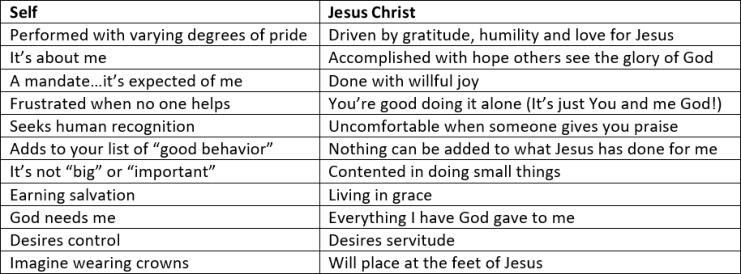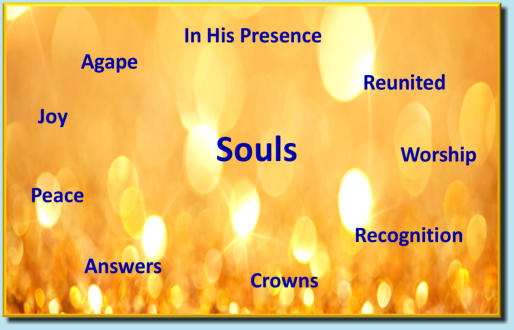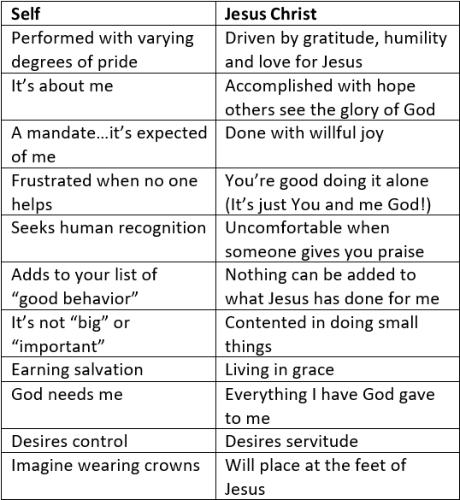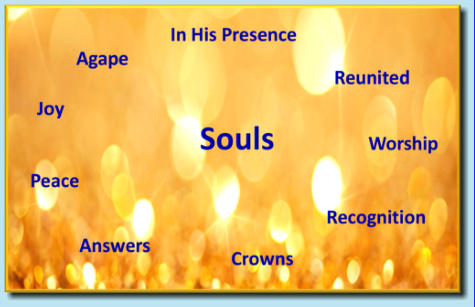
Introduction
This writing is intended for Christians who:
1
.
Are serving their Savior and Lord—in any capacity and via any means.
2
.
Understand
(and
know)
the
heart
is
deceitful.
“The
heart
is
deceitful
above
all
things
and
beyond cure. Who can understand it?” Jeremiah 17:9
3
.
Desire His righteousness and have asked God:
•
To
search
their
heart.
“
Search
me,
God,
and
know
my
heart;
test
me
and
know
my
anxious thoughts.” Psalm 139:23
•
To
guide
them
in
all
aspects
of
their
lives.
“See
if
there
is
any
offensive
way
in
me,
and
lead me in the way everlasting.” Psalm 139:24
The
purpose
of
this
writing
is
to
reveal
the
intentions
of
our
heart,
the
reasons
why
we
serve,
and those aspects of our daily walk that may be improved, so that:
1
.
We may more effectively glorify Him.
2
.
Our efforts (works) will endure testing during the Judgment Seat of Christ.
So, let’s start with a question…
Do
you
want
others
to
love
you,
based
upon
their
free
will,
unconditionally,
and
for
who
you
are?
Take a few moments to think about your answer.
•
Free will
means they have made an autonomous decision to love you.
•
Unconditional
means their love is not based upon what you do or fail to do.
•
For
who
you
are
means
they
look
past
all
of
your
little
“nuances”
that
can
cause
relationship issues and/or conflict. (None of us are perfect.)
The
overwhelming
majority
of
persons
will
answer
with
a
resounding
YES!
Well,
our
desire
to
be
loved
unconditionally
and
for
who
we
are
was
placed
there
by
our
Creator—as
part
of
our
design.
God
created
man
in
His
own
image
(Genesis
1:27).
The
desire
to
be
loved
by
free
will,
unconditionally
and
for
who
He
is…is
also
within
the
heart
of
God.
This
is
why
He
extends His grace and love (through His Son) so that we would respond with love to Him.
God
loves
us.
It
is
His
choice…for
God
is
love
(1
John
4:8).
Because
of
Jesus,
His
love
is
unconditional (regardless of our sin—past, present and future).
“Everyone who loves is born of God and knows God. In this the love of God was manifested
toward
us,
that
God
has
sent
His
only
begotten
Son
into
the
world,
that
we
might
live
through
Him.
In
this
is
love,
not
that
we
loved
God,
but
that
He
loved
us
and
sent
His
Son
to
be the propitiation for our sins.” 1 John 3:7-10
In other words,
“We love Him because He first loved us.” 1 John 4:19
When
we
look
deeper
into
our
design—which
transcends
the
animal
kingdom—our
attributes facilitate our ability to love God. For example, we:
•
Communicate
in
various
ways
.
We
can
speak
verbally,
non-verbally,
via
sign
language,
via technology, in more than one language, and by prayer.
•
Analyze
things
based
upon
different
viewpoints.
We
are
able
to
look
at
things
from
multiple angles—including identification of weighted benefits and costs.
•
Recognize
right
from
wrong.
Interesting
point…reflect
upon
your
“right
from
wrong
list”
before and after you knew Jesus Christ.
•
Make free-will decisions.
We are self-directed individuals who make choices in life.
•
Experience wide range of emotions
—from anger to love, and everything in-between.
•
Respond
with
gratitude.
Let’s
say
someone
recognizes
you
have
a
need,
and
fills
your
need
without
a
request
by
you
and
without
any
expectation
of
reimbursement.
Do
you
not have a desire to say thank you, and hope to return the favor some day?
•
Reflect
with
remorse
/
guilt.
When
looking
in
the
past,
we
sometimes
experience
regret
or guilt for what we failed to do, or did do.
•
Able
to
forgive.
Forgiveness
is
more
powerful
than
we
realize.
It
has
the
ability
to
break
the
chains
that
bind
us
to
sin,
and
can
open
our
heart
to
experience
God’s
love
when
we
forgive others (and ourselves).
•
Express
faith.
We
have
an
ability
to
rely
upon
those
whom
we
trust.
But
more
important,
placing
our
complete
trust
in
God
is
foundational
in
pleasing
Him—for
He
desires
our
trust.
But
without
faith
it
is
impossible
to
please
Him,
for
he
who
comes
to
God
must
believe
that
He
is,
and
that
He
is
a
rewarder
of
those
who
diligently
seek
Him.
Hebrews 11:6
•
Self-awareness and self-analysis:
o
Self-awareness
is
the
conscious
knowledge
of
our
character,
feelings,
motives,
and
desires.
o
Self-analysis
is
an
effort
to
understand
our
motives
and
the
reasons
why
we
do
what
we do.
Learning Exercise:
Review each of our design attributes above and determine the:
1
.
Direct / indirect influence on our ability to love God.
2
.
Detrimental impact on our ability to love God if we were not designed with the attribute.
Now
consider
the
fact
that
each
of
us
are
uniquely
designed.
Not
one
person
who
has
ever
lived
or
will
ever
live—throughout
all
of
time
(past,
present
and
future)—is
like
you.
You
are
unique
and
one-of-a-kind…by
design…God’s
design.
Our
uniqueness
includes
our
physical
characteristics, our personalities and our talents.
Talents
Talent
is
defined
as
an
aptitude
or
skill.
All
Christians
have
one
or
more
talents—each
can
be
used
to
glorify
Jesus
Christ.
A
talent
may
be
comprised
of
praying,
preaching,
cooking,
serving
others,
teaching,
cleaning,
singing,
writing,
playing
an
instrument,
listening,
helping,
and so forth.
Within
the
spiritual
realm,
any
activity
performed
for
someone
else—with
the
intent
of
glorifying
Jesus
Christ—has
far
more
weight
in
God’s
eyes
than
one
who
seeks
adulation
from
the
masses
upon
the
conclusion
of
a
music
concert,
stands
in
their
own
glory
after
winning
a
sporting
event,
or
is
motivated
by
self
under
the
premise
of
being
divinely
inspired
by God.
Consider
how
Jesus
recognized
the
woman
who
gave
only
two
mites
(about
a
penny)
as
contributing
far
more
than
those
who
contributed
much.
(Mark
12:41-44)
This
truth
is
relevant for our tithes and offerings…and applicable to what we do with our talents.
It’s not about how much we give.
It’s not about what we give.
It’s all about the desires and intent
of our heart as we give.
For nothing we do for ourselves will remain…
only what we do for Him.
The
origin
of
the
word
“talent”
is
from
the
Parable
of
the
Talents
spoken
by
Jesus.
In
biblical
times,
a
talent
was
a
weighted
amount
of
gold
or
silver
(a
value
of
money).
It
is
estimated
one biblical talent would be worth around $1.4 million dollars today.
Jesus
said,
“For
the
kingdom
of
heaven
is
like
a
man
traveling
to
a
far
country,
who
called
his
own
servants
and
delivered
his
goods
to
them.
And
to
one
he
gave
five
talents,
to
another
two,
and
to
another
one,
to
each
according
to
his
own
ability;
and
immediately
he
went
on
a
journey.
Then
he
who
had
received
the
five
talents
went
and
traded
with
them,
and
made
another
five
talents.
And
likewise,
he
who
had
received
two
gained
two
more
also.
But
he
who
had
received
one
went
and
dug
in
the
ground,
and
hid
his
lord’s
money.
After a long time, the lord of those servants came and settled accounts with them.”
“So,
he
who
had
received
five
talents
came
and
brought
five
other
talents,
saying,
‘Lord,
you
delivered
to
me
five
talents;
look,
I
have
gained
five
more
talents
besides
them.’
His
lord
said
to
him,
‘Well
done,
good
and
faithful
servant;
you
were
faithful
over
a
few
things,
I
will
make
you
ruler
over
many
things.
Enter
into
the
joy
of
your
lord.’
He
also
who
had
received
two
talents
came
and
said,
‘Lord,
you
delivered
to
me
two
talents;
look,
I
have
gained
two
more
talents
besides
them.’
His
lord
said
to
him,
‘Well
done,
good
and
faithful
servant;
you
have
been
faithful
over
a
few
things,
I
will
make
you
ruler
over
many
things.
Enter
into
the
joy of your lord.’”
Note
the
reward
for
the
increase
of
five
and
two
talents
received
the
same
response
and
reward—which
was
based
upon
seeking
an
increase.
However,
the
servant
who
received
one
talent
hid
the
talent
due
to
fear.
As
such,
he
did
not
receive
recognition
and
a
reward—but lost what was given him.
“Then
he
who
had
received
the
one
talent
came
and
said,
‘Lord,
I
knew
you
to
be
a
hard
man,
reaping
where
you
have
not
sown,
and
gathering
where
you
have
not
scattered
seed.
And
I
was
afraid,
and
went
and
hid
your
talent
in
the
ground.
Look,
there
you
have
what
is
yours.’
But
his
lord
answered
and
said
to
him,
‘You
wicked
and
lazy
servant,
you
knew
that
I
reap
where
I
have
not
sown,
and
gather
where
I
have
not
scattered
seed.
So,
you
ought
to
have
deposited
my
money
with
the
bankers,
and
at
my
coming
I
would
have
received
back
my
own
with
interest.
So,
take
the
talent
from
him,
and
give
it
to
him
who
has
ten
talents.’”
Matthew 25:14-30
We
are
blessed
when
we
use
one
of
our
talents
to
glorify
our
Savior.
It
is
an
indescribable
experience
when
we
witness
the
Holy
Spirit
using
us
to
touch
the
heart
and
soul
of
someone.
But
what’s
more
important
to
understand,
we
will
be
judged
as
to
the
intent
of
our
hearts
in
using
our
God-given
gifts.
Our
motives—which
can
range
from
glorifying
self
to
glorifying Jesus—will be tested by fire.
“For
we
must
all
appear
before
the
judgment
seat
of
Christ,
that
each
one
may
receive
the
things
done
in
the
body,
according
to
what
he
has
done,
whether
good
or
bad.”
2
Corinthians 5:10
“For
no
other
foundation
can
anyone
lay
than
that
which
is
laid,
which
is
Jesus
Christ.
Now
if
anyone
builds
on
this
foundation
with
gold,
silver,
precious
stones,
wood,
hay,
straw,
each
one’s
work
will
become
clear;
for
the
Day
will
declare
it,
because
it
will
be
revealed
by
fire;
and
the
fire
will
test
each
one’s
work,
of
what
sort
it
is.
If
anyone’s
work
which
he
has
built
on
it
endures,
he
will
receive
a
reward.
If
anyone’s
work
is
burned,
he
will
suffer
loss;
but
he
himself will be saved, yet so as through fire.” 1 Corinthians 3:11-15
The
Judgment
Seat
of
Christ
is
not
for
entrance
into
Heaven.
Our
“ticket”
for
entrance
into
Heaven was paid for by Jesus. However, we will be judged for our works:
•
That which is done for self will not endure.
•
That which is done for Jesus will be rewarded
Stated
earlier,
self-awareness
and
self-analysis
is
one
of
our
design
attributes.
As
such,
it
is
important
for
each
of
us
to
“Examine
yourselves
as
to
whether
you
are
in
the
faith.
Test
yourselves.” 2 Corinthians 13:5
The
comparative
table
below
will
assist
in
identifying
motives
of
your
heart
as
you
exercise
your
talents.
Please
note
that
it
is
not
intended
to
be
a
“hammer,”
or
a
list
of
thou
shall
and
shall
nots.
In
addition,
it
is
not
intended
to
judge
someone
else—for
no
one
has
the
right
to
judge
another
(only
God).
It
is
intended
for
you.
It
is
intended
to
assist
in
your
continued
growth in righteousness, as you become less like yourself and more like Jesus.
The
left
side
is
comprised
of
motives
and
thoughts
that
are
based
upon
self
(wood,
hay
and
straw).
The
right
side
are
motives
and
thoughts
that
are
based
upon
Jesus
Christ
(gold,
silver and precious stones).
“But
we
all,
with
unveiled
face,
beholding
as
in
a
mirror
the
glory
of
the
Lord,
are
being
transformed
into
the
same
image
from
glory
to
glory,
just
as
by
the
Spirit
of
the
Lord.”
2
Corinthians 3:18
“Do
not
lay
up
for
yourselves
treasures
on
earth,
where
moth
and
rust
destroy
and
where
thieves
break
in
and
steal;
but
lay
up
for
yourselves
treasures
in
heaven,
where
neither
moth
nor
rust
destroys
and
where
thieves
do
not
break
in
and
steal.
For
where
your
treasure is, there your heart will be also.” Matthew 6:19-21
Treasures in Heaven
There
are
various
perceptions
of
what
Heaven
will
be
like—including
what
the
treasures
may be. The
picture below lists aspects of Heaven we will most likely experience.
Starting
at
the
top
and
working
clockwise,
we
will
be
in
His
presence.
Imagine
for
a
moment
the
experience
of
feeling
His
radiated
holiness
and
perfect
love
as
it
passes
through
your
spiritual
body.
We
will
be
reunited
with
family
and
friends.
We
will
worship
together
in
a
manner
unlike
any
worship
we
have
experienced
on
earth.
We
will
receive
recognition
and
crowns
for
that
which
was
done
for
His
glory.
We
will
receive
answers
to
questions
that
we
have
held
in
our
mind
under
the
folder
called
“Trust
God,
He
will
explain.”
We
will
experience
a
degree
of
peace,
joy
and
agape
love
that
transcends
anything
we
have
ever
known.
Plus,
we
will
get
to
know
and
see
the
souls
who
were
saved
as
a
result
of
our
Holy
Spirit directed seed planting, watering, and/or harvesting.
It
is
also
important
to
realize
that
this
list
is
based
upon
human
understanding
and
reasoning.
For
there
will
be
much
more!
“Eye
has
not
seen,
nor
ear
heard,
nor
have
entered
into
the
heart
of
man
the
things
which
God
has
prepared
for
those
who
love
Him.”
1
Corinthians 2:9
Given all that God has done for us…
and all that He has in store for us…
it is important to remember…
nothing we do for ourselves will remain…
only what we do for Him!
Click
here
to
listen
to
a
wonderful
music
video
by
Keith
Green
called
“When
I
Hear
the
Praises
Start.”
I
personally
consider
this
to
be
the
best
song
ever
written…because
it
is
a
love song from Jesus to us.
May
you
continually
find
peace,
and
joy,
and
blessings
as
you
grow
in
His
grace
and
His
love.
Harold D. Thomas

Jesus



Thought-Provoking Questions
The
purpose
of
the
questions
is
to
facilitate
a
deeper
understanding
of
the
Bible,
Bible
study
topic
and
ourselves.
The
questions
may
be
answered
by
each
reader;
or
used
by
a
Bible
study
group
leader
or
church
pastor.
The
following
questions should be answered or discussed after reading “Treasures in Heaven.”
The questions are designed to assist in self-analysis and insight. As such, no answers are provided.
O
Why is it important for each Christian to examine themselves to determine underlying motivations?
O
Based
upon
1
Corinthians
3:11-15,
can
you
describe
and
contrast
the
differences
of
the
heart,
attitude
and
motivations of a Christian who builds upon their foundation with:
•
Gold, silver and precious stones?
•
Wood, hay and straw?
O
Based upon the Parable of the Talents (Matthew 25:14-30):
•
How would you define the word “talent?”
•
Is there an important relevance of servanthood in the use of a talent? Explain.
•
The following three questions are for personal self-reflection, and may not be appropriate for group discussion.
o
Has God given you any talents?
o
Based upon what you have done in your life thus far, do you think you will receive a reward… or ashes?
o
Can you identify one thing you can do differently in the future?
The questions may be viewed and downloaded as a PDF file by clicking on this button.
Can you think of someone who could benefit from reading this lesson? If yes,
CLICK HERE
for more info.





The words of Jesus Christ are in
red text.

Introduction
This writing is intended for Christians who:
1
.
Are
serving
their
Savior
and
Lord—in
any
capacity
and via any means.
2
.
Understand
(and
know)
the
heart
is
deceitful.
“The
heart
is
deceitful
above
all
things
and
beyond
cure.
Who can understand it?” Jeremiah 17:9
3
.
Desire His righteousness and have asked God:
•
To
search
their
heart.
“Search
me,
God,
and
know
my
heart;
test
me
and
know
my
anxious
thoughts.”
Psalm 139:23
•
To
guide
them
in
all
aspects
of
their
lives.
“See
if
there
is
any
offensive
way
in
me,
and
lead
me
in
the way everlasting.” Psalm 139:24
The
purpose
of
this
writing
is
to
reveal
the
intentions
of
our
heart,
the
reasons
why
we
serve,
and
those
aspects
of our daily walk that may be improved, so that:
1
.
We may more effectively glorify Him.
2
.
Our
efforts
(works)
will
endure
testing
during
the
Judgment Seat of Christ.
So, let’s start with a question…
Do
you
want
others
to
love
you,
based
upon
their
free
will, unconditionally, and for who you are?
Take a few moments to think about your answer.
•
Free
will
means
they
have
made
an
autonomous
decision to love you.
•
Unconditional
means
their
love
is
not
based
upon
what you do or fail to do.
•
For
who
you
are
means
they
look
past
all
of
your
little
“nuances”
that
can
cause
relationship
issues
and/or
conflict. (None of us are perfect.)
The
overwhelming
majority
of
persons
will
answer
with
a
resounding
YES!
Well,
our
desire
to
be
loved
unconditionally
and
for
who
we
are
was
placed
there
by
our
Creator—as
part
of
our
design.
God
created
man
in
His
own
image
(Genesis
1:27).
The
desire
to
be
loved
by
free
will,
unconditionally
and
for
who
He
is…is
also
within
the
heart
of
God.
This
is
why
He
extends
His
grace
and
love
(through
His
Son)
so
that
we
would
respond
with
love to Him.
God
loves
us.
It
is
His
choice…for
God
is
love
(1
John
4:8).
Because
of
Jesus,
His
love
is
unconditional
(regardless of our sin—past, present and future).
“Everyone
who
loves
is
born
of
God
and
knows
God.
In
this
the
love
of
God
was
manifested
toward
us,
that
God
has
sent
His
only
begotten
Son
into
the
world,
that
we
might
live
through
Him.
In
this
is
love,
not
that
we
loved
God,
but
that
He
loved
us
and
sent
His
Son
to
be
the
propitiation for our sins.” 1 John 3:7-10
In
other
words,
“We
love
Him
because
He
first
loved
us.”
1 John 4:19
When
we
look
deeper
into
our
design—which
transcends
the
animal
kingdom—our
attributes
facilitate
our
ability
to
love God. For example, we:
•
Communicate
in
various
ways
.
We
can
speak
verbally,
non-verbally,
via
sign
language,
via
technology, in more than one language, and by prayer.
•
Analyze
things
based
upon
different
viewpoints.
We
are
able
to
look
at
things
from
multiple
angles—including
identification
of
weighted
benefits
and costs.
•
Recognize
right
from
wrong.
Interesting
point…reflect
upon
your
“right
from
wrong
list”
before
and after you knew Jesus Christ.
•
Make
free-will
decisions.
We
are
self-directed
individuals who make choices in life.
•
Experience
wide
range
of
emotions
—from
anger
to
love, and everything in-between.
•
Respond
with
gratitude.
Let’s
say
someone
recognizes
you
have
a
need,
and
fills
your
need
without
a
request
by
you
and
without
any
expectation
of
reimbursement.
Do
you
not
have
a
desire
to
say
thank you, and hope to return the favor some day?
•
Reflect
with
remorse
/
guilt.
When
looking
in
the
past,
we
sometimes
experience
regret
or
guilt
for
what
we failed to do, or did do.
•
Able
to
forgive.
Forgiveness
is
more
powerful
than
we
realize.
It
has
the
ability
to
break
the
chains
that
bind
us
to
sin,
and
can
open
our
heart
to
experience
God’s love when we forgive others (and ourselves).
•
Express
faith.
We
have
an
ability
to
rely
upon
those
whom
we
trust.
But
more
important,
placing
our
complete
trust
in
God
is
foundational
in
pleasing
Him—for
He
desires
our
trust.
“But
without
faith
it
is
impossible
to
please
Him,
for
he
who
comes
to
God
must
believe
that
He
is,
and
that
He
is
a
rewarder
of
those who diligently seek Him.” Hebrews 11:6
•
Self-awareness and self-analysis:
o
Self-awareness
is
the
conscious
knowledge
of
our
character, feelings, motives, and desires.
o
Self-analysis
is
an
effort
to
understand
our
motives
and the reasons why we do what we do.
Learning
Exercise:
Review
each
of
our
design
attributes
above and determine the:
1
.
Direct / indirect influence on our ability to love God.
2
.
Detrimental
impact
on
our
ability
to
love
God
if
we
were not designed with the attribute.
Now
consider
the
fact
that
each
of
us
are
uniquely
designed.
Not
one
person
who
has
ever
lived
or
will
ever
live—throughout
all
of
time
(past,
present
and
future)—is
like
you.
You
are
unique
and
one-of-a-kind…by
design…God’s
design.
Our
uniqueness
includes
our
physical characteristics, our personalities and our talents.
Talents
Talent
is
defined
as
an
aptitude
or
skill.
All
Christians
have
one
or
more
talents—each
can
be
used
to
glorify
Jesus
Christ.
A
talent
may
be
comprised
of
praying,
preaching,
cooking,
serving
others,
teaching,
cleaning,
singing,
writing,
playing
an
instrument,
listening,
helping,
and so forth.
Within
the
spiritual
realm,
any
activity
performed
for
someone
else—with
the
intent
of
glorifying
Jesus
Christ—has
far
more
weight
in
God’s
eyes
than
one
who
seeks
adulation
from
the
masses
upon
the
conclusion
of
a
music
concert,
stands
in
their
own
glory
after
winning
a
sporting
event,
or
is
motivated
by
self
under
the
premise
of being divinely inspired by God.
Consider
how
Jesus
recognized
the
woman
who
gave
only
two
mites
(about
a
penny)
as
contributing
far
more
than
those
who
contributed
much.
(Mark
12:41-44)
This
truth
is
relevant
for
our
tithes
and
offerings…and
applicable to what we do with our talents.
It’s not about how much we give.
It’s not about what we give.
It’s all about the desires and intent
of our heart as we give.
For nothing we do for ourselves will remain…
only what we do for Him.
The
origin
of
the
word
“talent”
is
from
the
Parable
of
the
Talents
spoken
by
Jesus.
In
biblical
times,
a
talent
was
a
weighted
amount
of
gold
or
silver
(a
value
of
money).
It
is
estimated
one
biblical
talent
would
be
worth
around
$1.4 million dollars today.
Jesus
said,
“For
the
kingdom
of
heaven
is
like
a
man
traveling
to
a
far
country,
who
called
his
own
servants
and
delivered
his
goods
to
them.
And
to
one
he
gave
five
talents,
to
another
two,
and
to
another
one,
to
each
according
to
his
own
ability;
and
immediately
he
went
on
a
journey.
Then
he
who
had
received
the
five
talents
went
and
traded
with
them,
and
made
another
five
talents.
And
likewise,
he
who
had
received
two
gained
two
more
also.
But
he
who
had
received
one
went
and
dug
in
the
ground,
and
hid
his
lord’s
money.
After
a
long
time,
the
lord
of
those
servants
came
and
settled
accounts with them.”
“So,
he
who
had
received
five
talents
came
and
brought
five
other
talents,
saying,
‘Lord,
you
delivered
to
me
five
talents;
look,
I
have
gained
five
more
talents
besides
them.’
His
lord
said
to
him,
‘Well
done,
good
and
faithful
servant;
you
were
faithful
over
a
few
things,
I
will
make
you
ruler
over
many
things.
Enter
into
the
joy
of
your
lord.’
He
also
who
had
received
two
talents
came
and
said,
‘Lord,
you
delivered
to
me
two
talents;
look,
I
have
gained
two
more
talents
besides
them.’
His
lord
said
to
him,
‘Well
done,
good
and
faithful
servant;
you
have
been
faithful
over
a
few
things,
I
will
make
you
ruler
over
many
things. Enter into the joy of your lord.’”
Note
the
reward
for
the
increase
of
five
and
two
talents
received
the
same
response
and
reward—which
was
based
upon
seeking
an
increase.
However,
the
servant
who
received
one
talent
hid
the
talent
due
to
fear.
As
such,
he
did
not
receive
recognition
and
a
reward—but
lost what was given him.
“Then
he
who
had
received
the
one
talent
came
and
said,
‘Lord,
I
knew
you
to
be
a
hard
man,
reaping
where
you
have
not
sown,
and
gathering
where
you
have
not
scattered
seed.
And
I
was
afraid,
and
went
and
hid
your
talent
in
the
ground.
Look,
there
you
have
what
is
yours.’
But
his
lord
answered
and
said
to
him,
‘You
wicked
and
lazy
servant,
you
knew
that
I
reap
where
I
have
not
sown,
and
gather
where
I
have
not
scattered
seed.
So,
you
ought
to
have
deposited
my
money
with
the
bankers,
and
at
my
coming
I
would
have
received
back
my
own
with
interest.
So,
take
the
talent
from
him,
and
give
it
to
him
who has ten talents.’” Matthew 25:14-30
We
are
blessed
when
we
use
one
of
our
talents
to
glorify
our
Savior.
It
is
an
indescribable
experience
when
we
witness
the
Holy
Spirit
using
us
to
touch
the
heart
and
soul
of
someone.
But
what’s
more
important
to
understand,
we
will
be
judged
as
to
the
intent
of
our
hearts
in
using
our
God-given
gifts.
Our
motives—which
can
range
from
glorifying
self
to
glorifying
Jesus—will
be
tested by fire.
“For
we
must
all
appear
before
the
judgment
seat
of
Christ,
that
each
one
may
receive
the
things
done
in
the
body,
according
to
what
he
has
done,
whether
good
or
bad.” 2 Corinthians 5:10
“For
no
other
foundation
can
anyone
lay
than
that
which
is
laid,
which
is
Jesus
Christ.
Now
if
anyone
builds
on
this
foundation
with
gold,
silver,
precious
stones,
wood,
hay,
straw,
each
one’s
work
will
become
clear;
for
the
Day
will
declare
it,
because
it
will
be
revealed
by
fire;
and
the
fire
will
test
each
one’s
work,
of
what
sort
it
is.
If
anyone’s
work
which
he
has
built
on
it
endures,
he
will
receive
a
reward.
If
anyone’s
work
is
burned,
he
will
suffer
loss;
but
he
himself
will
be
saved,
yet
so
as
through fire.” 1 Corinthians 3:11-15
The
Judgment
Seat
of
Christ
is
not
for
entrance
into
Heaven.
Our
“ticket”
for
entrance
into
Heaven
was
paid
for by Jesus. However, we will be judged for our works:
•
That which is done for self will not endure.
•
That which is done for Jesus will be rewarded
Stated
earlier,
self-awareness
and
self-analysis
is
one
of
our
design
attributes.
As
such,
it
is
important
for
each
of
us
to
“Examine
yourselves
as
to
whether
you
are
in
the
faith. Test yourselves.” 2 Corinthians 13:5
The
comparative
table
below
will
assist
in
identifying
motives
of
your
heart
as
you
exercise
your
talents.
Please
note
that
it
is
not
intended
to
be
a
“hammer,”
or
a
list
of
thou
shall
and
shall
nots.
In
addition,
it
is
not
intended
to
judge
someone
else—for
no
one
has
the
right
to
judge
another
(only
God).
It
is
intended
for
you.
It
is
intended
to
assist
in
your
continued
growth
in
righteousness,
as
you
become
less
like
yourself
and
more like Jesus.
The
left
side
is
comprised
of
motives
and
thoughts
that
are
based
upon
self
(wood,
hay
and
straw).
The
right
side
are
motives
and
thoughts
that
are
based
upon
Jesus
Christ (gold, silver and precious stones).
“But
we
all,
with
unveiled
face,
beholding
as
in
a
mirror
the
glory
of
the
Lord,
are
being
transformed
into
the
same
image
from
glory
to
glory,
just
as
by
the
Spirit
of
the
Lord.” 2 Corinthians 3:18
“Do
not
lay
up
for
yourselves
treasures
on
earth,
where
moth
and
rust
destroy
and
where
thieves
break
in
and
steal;
but
lay
up
for
yourselves
treasures
in
heaven,
where
neither
moth
nor
rust
destroys
and
where
thieves
do
not
break
in
and
steal.
For
where
your
treasure
is,
there your heart will be also.” Matthew 6:19-21
Treasures in Heaven
There
are
various
perceptions
of
what
Heaven
will
be
like—including
what
the
treasures
may
be.
The
picture
below
lists
aspects
of
Heaven
we
will
most
likely
experience.
Starting
at
the
top
and
working
clockwise,
we
will
be
in
His
presence.
Imagine
for
a
moment
the
experience
of
feeling
His
radiated
holiness
and
perfect
love
as
it
passes
through
your
spiritual
body.
We
will
be
reunited
with
family
and
friends.
We
will
worship
together
in
a
manner
unlike
any
worship
we
have
experienced
on
earth.
We
will
receive
recognition
and
crowns
for
that
which
was
done
for
His
glory.
We
will
receive
answers
to
questions
that
we
have
held
in
our
mind
under
the
folder
called
“Trust
God,
He
will
explain.”
We
will
experience
a
degree
of
peace,
joy
and
agape
love
that
transcends
anything
we
have
ever
known.
Plus,
we
will
get
to
know
and
see
the
souls
who
were
saved
as
a
result
of
our
Holy
Spirit
directed seed planting, watering, and/or harvesting.
It
is
also
important
to
realize
that
this
list
is
based
upon
human
understanding
and
reasoning.
For
there
will
be
much
more!
“Eye
has
not
seen,
nor
ear
heard,
nor
have
entered
into
the
heart
of
man
the
things
which
God
has
prepared for those who love Him.” 1 Corinthians 2:9
Given all that God has done for us…
and all that He has in store for us…
it is important to remember…
nothing we do for ourselves will remain…
only what we do for Him!
Click
here
to
listen
to
a
wonderful
music
video
by
Keith
Green
called
“When
I
Hear
the
Praises
Start.”
I
personally
consider
this
to
be
the
best
song
ever
written…because it is a love song from Jesus to us.
May
you
continually
find
peace,
and
joy,
and
blessings
as
you grow in His grace and His love.
Harold D. Thomas




Jesus
Thought-Provoking Questions
The
purpose
of
the
questions
is
to
facilitate
a
deeper
understanding
of
the
Bible,
Bible
study
topic
and
ourselves.
The
questions
may
be
answered
by
each
reader;
or
used
by
a
Bible
study
group
leader
or
church
pastor.
The
following
questions
should
be
answered
or
discussed after reading “Treasures in Heaven.”
The
questions
are
designed
to
assist
in
self-analysis
and
insight. As such, no answers are provided.
O
Why
is
it
important
for
each
Christian
to
examine
themselves to determine underlying motivations?
O
Based
upon
1
Corinthians
3:11-15,
can
you
describe
and
contrast
the
differences
of
the
heart,
attitude
and
motivations
of
a
Christian
who
builds
upon
their
foundation with:
•
Gold, silver and precious stones?
•
Wood, hay and straw?
O
Based
upon
the
Parable
of
the
Talents
(Matthew
25:14-30):
•
How would you define the word “talent?”
•
Is
there
an
important
relevance
of
servanthood
in
the use of a talent? Explain.
•
The
following
three
questions
are
for
personal
self-
reflection,
and
may
not
be
appropriate
for
group
discussion.
o
Has God given you any talents?
o
Based
upon
what
you
have
done
in
your
life
thus
far,
do
you
think
you
will
receive
a
reward…
or
ashes?
o
Can
you
identify
one
thing
you
can
do
differently
in the future?
The
questions
may
be
viewed
and
downloa
ded
as
a
PDF
file by clicking on this button.
Can
you
think
of
someone
who
could
benefit
from
reading
this lesson? If yes,
CLICK HERE
for more info.





The words of Jesus Christ
are in red text.
